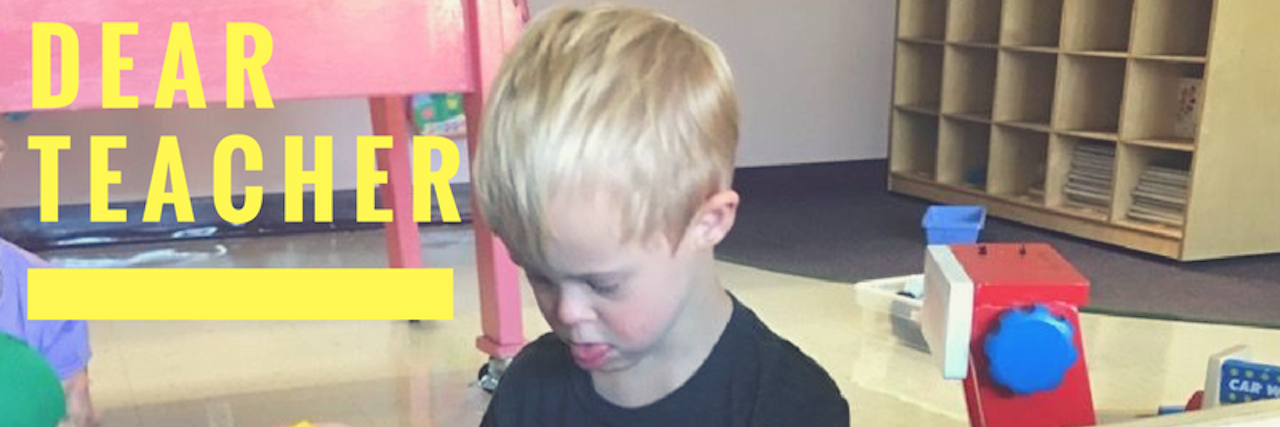It’s the time of year for organizing classrooms, lesson planning and memorizing new names. When I was a teacher, this time of year brought a mixture of excitement and trepidation. Those emotions remain the same now that I’m a parent to a child with Down syndrome.
Instead of fearing I would be ill-equipped to deal with a whole new group of students with different needs, I now dread my son’s teacher will fear Down syndrome and what it means for his or her classroom.

I know, from personal experience, even a Master’s in Education does not fully prepare teachers to meet the needs of all learners. Teacher training is often a “one size fits all” approach until the student-teacher is thrown to the wolves (I mean, students LOL). But here’s the most important thing you need to know to meet the needs of my son who has Down syndrome: You don’t need a Master’s in Education to care and have an open-mind. Those two characteristics alone can lead to my child’s (and every other child’s) success in your classroom.
So here are five things to remember when teaching a student with an intellectual disability:
1. He’s more alike than different.

Troy (left) with his typical twin brother, Hunter (right)
Imagine if the color of your eyes was the determining factor of whether you were cut out to be a teacher. Not cool, right? Troy has a right to the same educational opportunities as his typical twin brother. But the instant a teacher looks at my two boys side-by-side, many have already made a judgement that Troy can’t cut it in a regular class.
“Different” is all about perspective. To you, my son may not fit the typical “model student” mold, but to me he’s just as inquisitive and bright as his typical twin brother. Stop looking at those gorgeous almond-shaped eyes and his cute toddler-like stature; this kid wants to learn. Expect he wants to act and learn like his typical peers, and you may be surprised at what he can achieve.
2. He needs you to believe in the power of “yet.”
Our mindset determines the way we see the world. I want Troy’s teachers to have a “Growth Mindset.” This is the power of believing Troy can learn and improve. I’m not delusional; I understand my son has an intellectual disability, and will likely not “keep up” with his typical twin brother. But with a growth mindset it’s OK if he doesn’t keep up, because he has the power of “yet.”
He may not read and write when his typical peers do, but that doesn’t mean he’ll never read and write. It also doesn’t mean he deserves low expectations and subpar educational experiences. Whenever you feel the urge to say: “Troy can’t _______,” instead say “Troy can’t __________ yet.” This will change your entire perspective about Down syndrome and what my son can achieve.
3. He understands when he’s being segregated.
Even with 40 years of federal law and research to back up full inclusion for students with intellectual disabilities, schools continue to segregate students like my son in “specialized” classes. Teachers and administrators say this is what’s best for these “special” students, but the research proves it’s not.
Listen, I understand inclusion can be hard and scary, but my son doesn’t deserve the path of least resistance. He’s smart enough to know he’s being segregated from his typical peers, and he’ll live up to those pathetically low expectations. We must prepare him for life, and as far as I know there are no “special” grocery shops, apartments or jobs when he graduates.
Many teachers argue that having a student with an intellectual disability in their class will be detrimental to their typical students. I disagree wholeheartedly! In fact, research shows typical student achievement either stays the same or increases with the presence of students with diverse abilities. The reason is simple and has been known for generations: the best way to understand a concept is to teach it.
What a wonderful opportunity to teach empathy and increase achievement levels of all your students. In a meaningful inclusive classroom, all students feel valued for who they are. High achieving students can reinforce what they’ve learned by teaching others, and students like my son can teach those same students that life is about more than just high grades and test scores.
5. More than anything, he needs an open-minded teacher.

You can know all the latest teaching strategies to optimize an inclusive classroom: Universal Design for Learning, Process Oriented Guided Inquiry Lessons, Reality Pedagogy, etc. But if you don’t have an open-mind, none of these fancy strategies will work. I’d rather have a teacher who’s clueless about all of the above, but truly accepts Troy and believes he can learn than a teacher who thinks my son is helpless.
It’s up to you to teach other students my son’s disability is not to be feared. They’ll be watching you.
And remember, parents of students with disabilities want their child’s teacher to succeed. Come to us for advice. We are the experts on our child, and we can be an invaluable asset to your classroom success. We appreciate you!
We know you may be scared, but our child and your students are worth it. Take the challenge and be the change that’s needed in this world.
Follow Troy’s journey of inclusion at www.inclusionevolution.com.
We want to hear your story. Become a Mighty contributor here.

